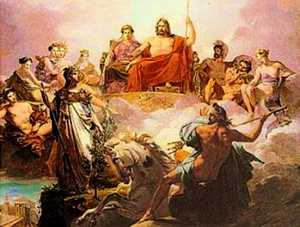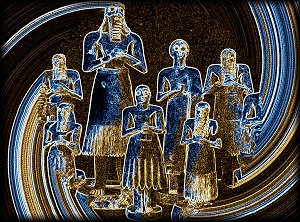Last month I posted my reading of an interesting discussion by senior research fellow M. L. West about the nature of ancient Mid-East and Mediterranean world polytheism and how it appears to have evolved into monotheism in late antiquity.
nature of ancient Mid-East and Mediterranean world polytheism and how it appears to have evolved into monotheism in late antiquity.
This post continues the remainder of that discussion by West. It outlines how and why the philosophers moved the intellectual world to a position where monotheism came to be embraced as the most economical answer to “the big questions” of the day.
As in that previous post, I am discussing the first chapter by Martin West in Pagan Monotheism in Late Antiquity, edited by Polymnia Athanassiadi and Michael Frede.
On the quest of the sixth and fifth century Greek philosophers West begins:
To invoke God as an explanation of phenomena is to confess that you do not know how to explain them rationally — unless, that is, you are prepared to supply a rational explanation of God. The Presocratics, however, did try to explain God. What they sought to eliminate from the world was not divinity as such but caprice and the arbitrary events which had formerly been ascribed to divine initiative. (p.30)
Guiding principles: Depersonalize and Economize
Rather than discard gods as an explanation, what these philosophers did was to depersonalize the gods of the myths. By depersonalizing them and morphing them into abstract principles they hoped to discover ageless and unchanging forces and powers and principles in place of the moody temperamentalism of human-like gods. They may retain the names of some of these gods for those abstract agencies, but at least such impersonal phenomena would be worthy of the label “god” in their view.
“Among the principles that informed these men’s theorizing were economy and coherence.” They valued the idea of a single cause over many causes. The fewer gods at the apex who could be deduced to be guiding all below the better, although some thinkers retained a small hierarchy of a few agencies at the top.
Thales (ca 624-547 b.c.e) — getting the abstractions right
West sees Thales as the one who began to emancipate such terms as “soul” and “god” from their conventional mythical applications. Continue reading “How Polytheism morphed into Monotheism: philosophical moves, 1”

 One of the more intriguing books I read not many years ago was
One of the more intriguing books I read not many years ago was